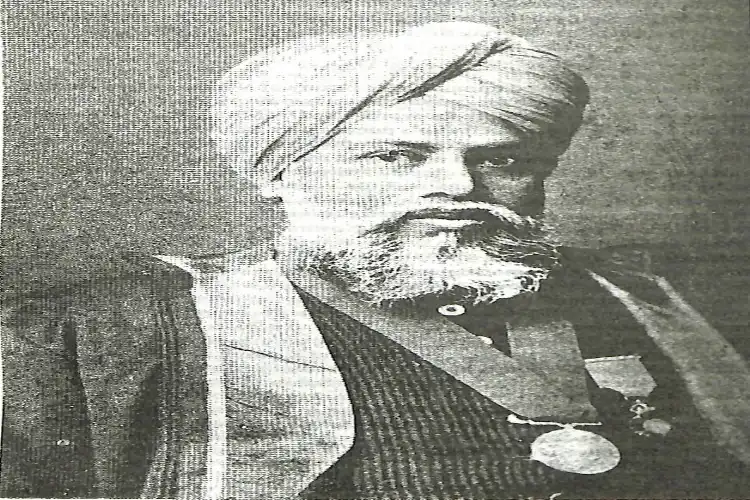 Saquib Salim
Saquib Salim
On November 23, 1858, a 22-year-old man launched a printing press at Lucknow. The young owner was Munshi Nawal Kishore and the press, Nawal Kishore Press (NKP), would go on to become one of the largest publishers in the subcontinent for the decades to come. Those were the times when Indians had faced defeat at the hands of the English in the revolt of 1857 and seen many massacres. Islamic religious scholars like Haji Imdadullah and Maulavi Ahmadullah Shah had led the revolt and therefore faced persecution. In those dark days, Muslims were growing hopeless about their future in India, Nawal Kishore came as a saviour.
Ameer Hasan Nurani, the author of his biography Sawanih Munshi Nawal Kishore, says that after 1857, when all the Madrasas, Islamic libraries, and centers of Islamic learning had been destroyed by the English, Nawal Kishore launched a campaign to save and restore the literature and books in the guise of his venture. He brought all the Islamic scholars, uprooted during 1857, to one place by providing them jobs at NKP.
It was in the post-1857 despondency that Indian Muslims were into a self-introspection mode. As a result, Muslims established orthodox Islamic institutions like Darul Uloom at Deoband in 1866 and a modern educational institution at Aligarh. It’s interesting to note that while the Muslims took almost a decade to start any Islamic movement, Nawal Kishore launched his ‘movement’ within a few months of the last battle of 1857.
Maulana Qasim Nanautvi and Maulana Rashid Ahmad Gangohi started the Deoband movement for taking Islamic learning to the common people. The idea was to make Islamic learning popular among Muslims. Until then, a few had access to copies of the Quran. NKP started printing the copies of Quran, Hadith, Jurisprudence, and their commentaries and made it affordable for people to buy them. Nawal Kishore printed the Urdu translations of the Arabic texts and printed them. In this way, poor Muslims could also access copies of the Quran and other religious books.
Generally, people appreciate Deoband for spreading the religious teachings across the subcontinent and beyond by developing a network of madrasas. However, rarely do they appreciate the fact that it was Nawal Kishore who ensured the development of these madrasas by providing them with books for curriculum. Nawal Kishore donated books to Darul Uloom, Deoband. The madrasas running on public funds could not afford books for a large number of students. He ensured that enough books were printed he printed come at an affordable price for madrasas in India, China, Iran, Afghanistan, and other countries. Availability of Urdu books for curriculum allowed a network of madrasas to thrive and bring Islamic education to the masses.
Nawal Kishore employed a few of the most well known Islamic and Urdu scholars like Maulana Syed Ameer Ali Malihabadi, Maulana Muhammad Ahsan Nanautvi, Maulana Fakhruddin Firangimahli, Maulana Khurram Ali, Maulana Ehtashamuddin Moradabadi, Maulana Fazal Ahmad, Mufti Ghulam Sarwar Lahori, Maulana Muhammad Ismail, and Tasadduq Hussain Rizvi who compiled, edited and translated religious and literary texts at NKP.
About the press, Nazir Kakorvi wrote, “No other place in India could boast of having as many famous writers, editors, poets, and religious scholars, as this single press in Lucknow had.” NKP provided bread and butter to the scholars at a time when the British were ruthlessly crushing the indegionious knowledge system.
Nawal Kishore paid special attention to the printing of the Quran. He printed the Quran in different sizes and with translations as well. At the time of printing, he took care that all the workers at the press were Muslims and they performed ablution before printing. The whole press was cleaned and clean sheets were spread on floors so that no paper fell on earth. After printing the Quran he would introduce it to the market at very low prices. Nurani wrote, “in this fashion, the Quran started reaching not only to the urban elite but also to the poor and rural Muslims. Teaching the Quran became easier…… Apart from India, the Quran printed at this press reached China, Iran, Afghanistan, and Turkey.”
Apart from the Quran, Nawal Kishore printed Hadith and Islamic Jurisprudence in Arabic and also in Urdu. His efforts ensured that the books reached Muslim homes and led to the opening of more Madrasa and Islamic institutions where Islamic scholars got decent jobs as translators and editors.
Next time when you look at a Madrasa, read an Islamic book or see a practicing Muslim in India, pay a silent tribute to this Hindu who ensured that Islam thrives in India and abroad under the assault of the British Empire.
(Saquib Salim is a historian and a writer)

 Saquib Salim
Saquib Salim